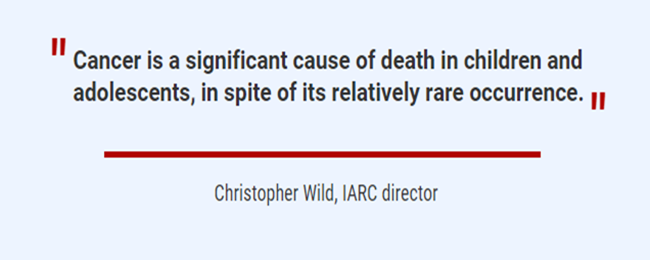
Global childhood cancer rates jumped 13% in the decade to 2010 compared to the 1980s, according to a UN-backed study that says the increase may be due in part to improved detection.
For children under 15, the incidence rate of cancer was 140 per million during the first decade of this century, the International Agency for Research on Cancer (IARC) reported in The Lancet Oncology.
Locally, the Cancer Association of South Africa (CANSA) in a previous review stated that many developing countries are going through rapid societal and economic changes, and there is a shift toward lifestyles representative of industrialised countries. These factors, along with changes in reproductive, dietary, and hormonal risk factors, are contributing to the rising cancer rates.
Significant cause of death
Part of the increase compared to the 1980-1990 period "may be due to better, or earlier, detection or these cancers," the agency said in a statement.
Data collected on 300 000 cancer cases diagnosed in 2001-2010 showed that leukaemia accounted for nearly a third of childhood cancers, followed by tumours of the central nervous system (20%) and lymphomas (12%).
In children under five, a third of cases were embryonal tumours, such as neuroblastoma.
Incidence among adolescents 15 to 19 years old over the same decade was 185 per million.
"Cancer is a significant cause of death in children and adolescents, in spite of its relatively rare occurrence," compared to adult cancer rates, said IARC Director Christopher Wild.
Cancers in children are more likely to be triggered by genetic factors.
New guidance on prostate cancer screening
Meanwhile, a US government advisory panel had reversed its opposition to a controversial prostate cancer screening test for men aged 55 to 69, saying it could slightly reduce the mortality rate, according to draft recommendations published Tuesday.
Patients are now advised to discuss the benefits and harms of prostate-specific antigens (PSA)-based screenings with their physicians and then decide individually whether it's the best route.

The latest recommendation says that overall, PSA-based screening for men aged 55 to 69 "offers a small potential benefit of reducing the chance of dying of prostate cancer".
For men 70 and older, the advisory panel continues to recommend against PSA-based testing, arguing that for this age group, prostate cancer evolves slowly and the 10-year survival rate is relatively high.
The lifetime risk of developing cancer was one in three for men and one in four for women, a previous study stated.
Uneven coverage
The report makes no attempt to determine what portion of the reported increase in incidence is due to better diagnoses, or other factors such as infections and pollution.
Data for the study came from 153 cancer registries in 62 countries, departments and territories representing about 10% of the world's children.
But coverage was very uneven: nearly 100% of the child population in the North America and Europe was included, but only 5% or less for children in Africa and Asia.
In low-income countries, data collection is difficult due to under-funded health systems and statistical services.
"Often focusing on the small proportion of cancers occurring in children is not seen as a priority," the IARC said in a statement.
Read more:




 Publications
Publications
 Partners
Partners















